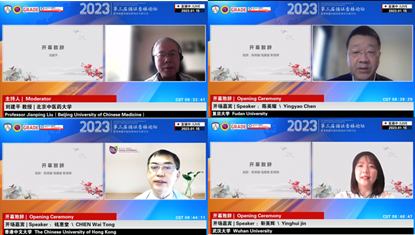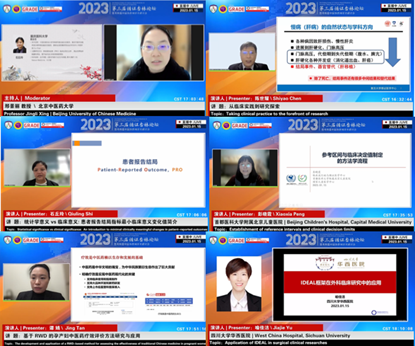
Cochrane China recently hosted a virtual event for the evidence-based medicine community that brought together many of its partners, local expertise, and international speakers. Here the team provides an overview of who was involved and what was covered at the event.
The 3rd Beijing forum of evidence-based medicine and Cochrane China Network Symposium was successfully held virtually on January 15th, 2023. The host of this conference were Cochrane China Network and Beijing GRADE Center. The organizers are Centre for Evidence-based Chinese Medicine, Beijing University of Chinese Medicine, affiliate of the Cochrane China Network; Beijing GRADE Center; and Institute for Excellence in Evidence-Based Chinese Medicine, Beijing University of Chinese Medicine. The co-organizers are affiliates of the Cochrane China Network, including Nethersole School of Nursing, Faculty of Medicine, Chinese University of Hong Kong; Evidence-based Medicine Centre, Fudan University; Centre for Evidence-based and Translational Medicine, Wuhan University; Cochrane China Centre, West China Hospital, Sichuan University; Centre for Evidence-based Medicine and Clinical Research, Peking University; School of Public Health, Chongqing Medical University; Institute of Health Data Science, Lanzhou University; Evidence-based Medicine Centre, University of Nottingham Ningbo.
Professor Liu Jianping, director of the Centre for Evidence-Based Medicine of Beijing University of Chinese Medicine, and senior research fellow Fei Yutong at Beijing University of Chinese Medicine served as the chairmen of the conference. Meanwhile, the conference invited Professor Gordon Guyatt, McMaster University, Canada, senior management of the Cochrane China Network headquarters, a total of 5 internationally renowned scholars from the United Kingdom, the United States, Hong Kong and other countries and regions, as well as speakers from 9 member units of the Cochrane China Network. In total, 25 scholars gave academic reports.
The conference conducted in-depth exchange and discussions of cutting-edge evidence-based medicine topics, which was divided into four modules: interpretation of the Cochrane review publishing policy, translational evidence, research frontiers in systematic reviews and evidence synthesis, and research methods in clinical practice.

To start, Liu Jianping, the chairman of the conference, Centre for Evidence-Based Medicine of Beijing University of Chinese Medicine, and Chen Yingyao, Qian Huitang and Jin Yinghui, the rotating chairmen of the Cochrane China Network executive committee, delivered opening speeches, respectively.
Liu Jianping briefly introduced the origin and development of the Cochrane China Network, and hoped that everyone could communicate and exchange with each other on the progress and achievement in methodologies, as well as the opportunities and challenges faced through this conference.
Chen Yingyao, on behalf of the Cochrane China Network executive committee, warmly welcomed the presence of all experts and listeners attending the conference, and expressed heartfelt thanks to the hosts and organizers of the conference, as nine member units from eight regions could carry out academic exchanges through this cloud platform.
Qian Huitang stated that the conference invited experts and scholars from home and abroad to make academic reports, which provided a platform for communication and exchange among member units, and wished the conference a complete success. Jin Yinghui said that Cochrane China Network has been trying to participate in the production, dissemination and translation of evidence since the establishment of it two years ago, and hoped to attract more researchers and clinical workers to improve patients' health concepts based on the best evidence through the academic conference held biennially.

On the morning of January 15th, the module of the conference was interpretation of the Cochrane review publishing policy. Catherine Spencer, the Cochrane’s chief executive officer, Gordon Guyatt, the founder of evidence-based medicine, McMaster University, Tiffany Duque, the central executive team of Cochrane, Liu Jianping, Beijing University of Chinese Medicine, and Liu Qin, Chongqing Medical University, were invited to explain the content Changes and New Strategies of Cochrane, GRADE for Network Meta-analysis, Communicating Science & Evidence during Health Emergencies, Cochrane Review of Traditional Chinese Medicine: Current Status and Challenges, and Interpretation of the Cochrane Review Publishing Policy in simple terms. The conference was hosted by Fei Yutong.

On the morning of January 15th, with the module of “translational evidence–1”, Susan Wieland, director of Cochrane Complementary Medicine Department, Jin Yinghui, Wuhan University, Chen Yaolong, Lanzhou University, and Xia Jun with GRADE Center of university of Nottingham Ningbo were invited to separately report on Cochrane Complementary Medicine: The Global Benefit of Chinese Collaboration, Implementation Evaluation of Clinical Practice Guidelines, Scientificity, Transparency, Applicability and Rankings (STAR) Tool for Clinical Practice Guidelines, and Use of Cochrane's Reviews to Inform WHO Guidelines, which were focused on as a hot issue and frontier of research related to guidelines. The conference was hosted by Li Xun.

On the afternoon of January 15th, the conference’s module was “translational evidence–2”. It invited Richard Hubbard, University of Nottingham Ningbo, Hao Yufang, Beijing University of Chinese Medicine, Tian Jinhui, Centre for Evidence-based Medicine of Lanzhou University, Li Xun, Beijing University of Chinese Medicine, and Wang Yongbo, Center for Evidence-Based and Translational Medicine, Zhongnan Hospital of Wuhan University, to reported on Using Routinely Collected Data for Clinical Research, Development and Adaptation of Nursing Guidelines for Integrative Chinese and Western Medicine, Progress and Challenges of the Research Methods on the Synthesis and Translational Evidence in Evidence Ecosystem, Enhancing Medical Students' Awareness of Evidence-based Medicine and Their Ability to Transform Knowledge Through Cochrane Evidence, Development of Clinical Practice Guideline Knowledge Graph, surrounding the key issues of interest in the process of developing and evaluating evidence-based medicine evidence. The conference was hosted by Wang Ping.

In the module of “research frontiers in systematic reviews and evidence synthesis”, Zhan Siyan, Peking University, Nie Xiaolu, Beijing Children's Hospital, Capital Medical University, Wu Shanshan, Beijing Friendship Hospital, Capital Medical University, Yang Zhirong, Shenzhen Institute of Advanced Technology, Chinese Academy of Sciences, Mou Huanyu and Li Caixia, Chinese University of Hong Kong, and Huang Qiao, Wuhan University, were invited to introduce Progress in Evidence Synthesis, Umbrella Reviews: Strengths and Limitations, Evidence Synthesis of Predictive Models: A Case Study of Liver Cancer Risk Prediction, A New Method for Evidence Synthesis to Determine the Effectiveness of COVID-19 Vaccines, Effectiveness of Dyadic Psychoeducational Intervention for Stroke Survivors and Family Caregivers on Functional and Psychosocial Health: A Systematic Review and Meta-analysis, Effects of Nurse-led Interventions on Early Detection of Cancer: A Systematic Review and Meta-analysis, and Development and Promotion of An Online Helper for Systematic Reviews of Evidence-based Medicine. The conference was co-hosted by Han Mei, Beijing University of Chinese Medicine, and Sun Feng, Peking University.

In the “research methods in clinical practice” module, Chen Shiyao, Fudan University, Shi Qiuling, Chongqing Medical University, Peng Xiaoxia, Beijing Children's Hospital, Capital Medical University, Tan Jing and Yu Jiajie, West China Hospital, Sichuan University, were invited to introduce Taking Clinical Practice to the Forefront of Research, Statistical Significance VS Clinical Significance: An Introduction to Minimum Clinically Meaningful Changes in Patient-reported Outcomes, Establishment of Reference Intervals and Clinical Decision Limits, The Development and Application of A RWD-based Method for Assessing the Effectiveness of Traditional Chinese Medicine in Pregnant Women, and Application of IDEAL in Surgical Clinical Researches. The conference was hosted by Xing Jingli.

This forum is another grand conference of the Cochrane China network two years after the founding conference of the Cochrane China Network. It is a high-level international conference in the field of Chinese evidence-based medicine. It is expected that Cochrane China Network will have better development in the work and research of Cochrane with the deeper and further academic collision and exchange.
A warm thank you and congratulations to everyone involved!
- Learn more about Cochrane China
- Get involved with Cochrane
- Learn more about events happening at Cochrane
Writen by Wang Ping and Li Xun. Reviewed by Fei Yutong, Liu Jianping, Li Feng, and Li Chenhui.

